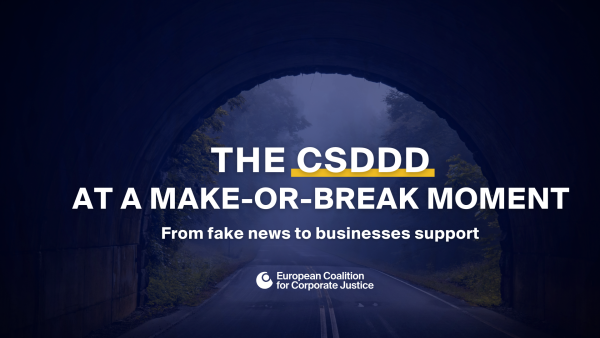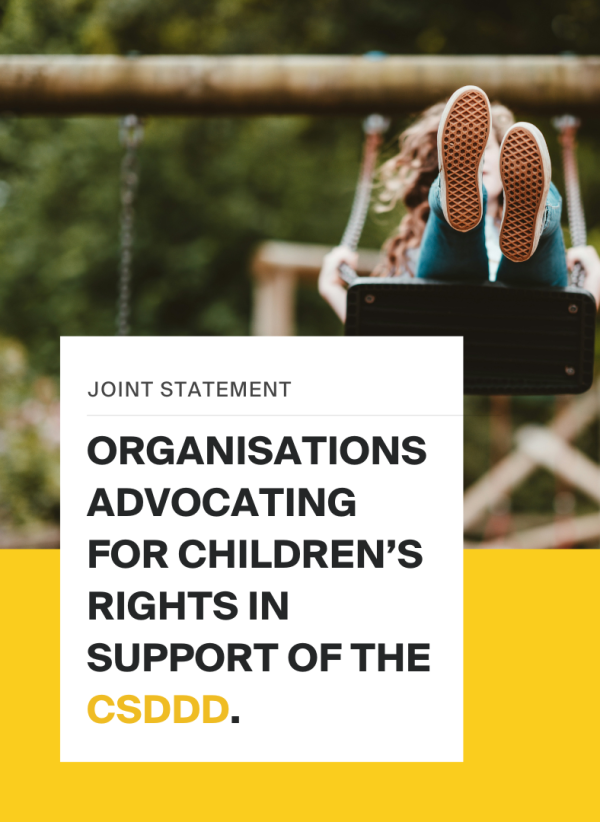This website uses cookies so that we can provide you with the best user experience possible. Cookie information is stored in your browser and performs functions such as recognising you when you return to our website and helping our team to understand which sections of the website you find most interesting and useful.

As the Corporate Sustainability Due Diligence Directive (CSDDD) nears a crucial juncture in its legislative and political journey, recent developments in Germany have intensified the debate surrounding this EU milestone in holding corporations accountable. With the CSDDD waiting for approval by the Council of the European Union’s COREPER on February 9th, the stakes have never been higher.
The final text is an inter-institutional compromise with significant concessions made to the EU capitals for an agreed directive ahead of the EU elections. Even so, passing the CSDDD is a pivotal step to shift business conduct to respect people and the planet. Large numbers of citizens have been demanding an EU Due Diligence law on corporate accountability for many years. Moreover, during the EU legislative process over 100,000 EU citizens have signed a petition demanding a strong and ambitious EU CSDD Directive. A failure to pass the law would jeopardise the protection of countless vulnerable lives and livelihoods in the global economy. A technical and legal reminder: under international law, it is an obligation for member states to protect individuals and groups against human rights abuses by third parties including corporations.
Germany's positioning: A minority party betrays the consensus on sustainability due diligence
Last Tuesday, Germany announced its abstention on the CSDDD, a u-turn decision contrasting Germany’s strong involvement in the negotiations. The fact that Germany abstains is outrageous given the fact that the law was tailored to German interests and legal framework: article 22 on civil liability was heavily rewritten to suit Germany.

This follows an announcement by the FDP-led ministries of Justice and Finance that they intend to block the legislation. This is an assertive internal power move from the smallest party in the coalition – the Freie Demokratische Partei (FDP), currently polling at just 4% of popular support in Germany. The FDP has a history of pushing against progressive laws in the coalition, like the ban on combustion engines, where their refusal to compromise led to Germany abstaining.
The FDP has deployed unusually aggressive tactics to block the CSDDD, to the point of ignoring regular negotiation channels. Most recently, Minister of Justice Marco Buschmann sent a letter to all member states in the Council criticising the Directive. Member States would do well to interpret the letter as a defiance of Germany’s spirit to abstain and not block the legislation. As Scholz himself stated when speaking to reporters in Brussels, “It would be nice if there was a supply chain law not only in Germany but also at the European level.”
This is only the latest evidence of FDP Ministers Christian Lindner and Marco Buschmann misrepresenting the German position. Together they sent a public letter to German industry claiming falsely that the rejection of the two German ministers led to a defacto German abstention: “In the Council of the European Union, this results in Germany abstaining.”
Meanwhile, German businesses like @Bayer are “deeply concerned”
“The #CSDDD offers a historic chance for an EU-wide level playing field. A Europe-wide regulation means that competitive advantages at the expense of people & envi will be prevented”https://t.co/l9Sb1VZYSK pic.twitter.com/ew4AjWTHpm
— European Coalition for Corporate Justice (@ECCJorg) February 7, 2024
In fact, in his competency over the decision-making process, Scholz could have defended the original coalition agreement that explicitly supported an effective EU Directive aligned with international standards. Ultimately Scholz prioritised the cohesion of a struggling coalition relationship, and yesterday Germany publicly announced its abstention. This development poses a significant challenge to the ongoing efforts for corporate accountability.
However, it’s important to emphasise that German abstention does not mean the end of the CSDDD. Council and all EU capitals must vote and approve the final text.
Backlash from German businesses: CSDDD abstention not in our name
Now, Buschmann faces backlash from small, medium and large German businesses who are “deeply concerned” about a potential German CSDDD abstention, and call for the passage of “the democratically achieved compromise to thereby provide companies with legal certainty and fair competitive conditions”. Moreover, a recent article by the German investigative journal Spiegel also shows that 51% of interviewed companies expect “rather positive” long-term financial impacts from the CSDDD, with 20% expecting “very positive” impacts.
The FDP has also waged a disinformation campaign using fake news in their claims against the CSDDD, bringing old but incorrect myths of the impact of the Directive on small businesses, and incorrectly claiming that they are defending a united German business front against the Directive. But German businesses have responded to this stance that it is not in their name.
The #CSDDD is at a make-or-break moment.
But this EU milestone in holding corporations accountable is also a target of #FakeNews🚨
Let’s debunk the myths & set the record straight ahead of the @EUCouncil‘s agreement🧵 pic.twitter.com/lev8FOeItZ
— European Coalition for Corporate Justice (@ECCJorg) February 6, 2024
At stake: to ensure private profit does not trump human rights or the environment
Corporate human rights and environmental abuses are as old as the modern economy and are driving many of the sustainability crises facing the planet. National due diligence laws are already in force in France and Germany – with advanced national proposals in the Netherlands, Spain, Finland, Belgium, Luxembourg and Austria. Failing to pass the CSDDD at the EU level will expose EU businesses to an increasingly fragmented regulatory landscape and the reality of varying national compliance standards. Much worse, the estimated 650 million workers and communities in global value chains (including inside the EU) will continue risk to suffer human rights and environmental abuses.
Now, all eyes are on the Council for the EU Ambassadors to express Member States’ support for this crucial and long-necessary legislation.
Key dates on the political process
- Friday, 9 FEB: Council of the European Union meeting led by the Belgian Presidency to approve the text.
- Tuesday, 13 FEB: JURI vote to approve the text and send it to the plenary.
- April: Parliament and Council’s vote
Want to know more?









